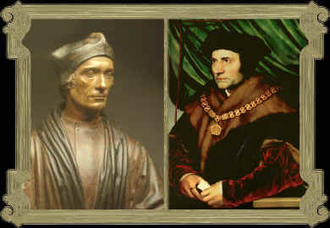St Thomas More and St John Fisher

Both saints held high office in England but submitted to martyrdom, rather than accept Henry VIII's claim to be head of the Church.
Saint John Fisher was a learned teacher and chancellor at Cambridge university, and a friend of the humanist Erasmus. He became Bishop of Rochester in 1504 at the age of 35. When asked to accept the King as head of the Church he said he could not.
"I do not condemn any other men's consciences," he said. "Their consciences must save them and mine must save me."
He was tried and executed for treason on June 17 1535. He was 66.
Saint Thomas More was the Lord Chancellor. A younger man than St John Fisher, he had a large family and household to support and said he did not wish to die.
"I am not so holy that I dare rush upon death," he said.
But he could not accept the King as supreme head of the Church or condone his divorce. Rather than make a public pronouncement he resigned from his post and hoped to retire quietly. But the King would not accept his silence. St Thomas was arrested, imprisoned at the Tower of London for 15 months and then declared guilty of treason and condemned to death.
He was executed nine days after St John Fisher. He was 57. From the scaffold he said: "I die the King's good servant, but God's first."
The story of St Thomas More is told in Robert Bolt's play 'A Man For All Seasons' which was made into a film directed and produced by Fred Zinnemann in 1966, winning six Academy Awards.
See also: ICN 22 June, 2021 - St Thomas More, Refugees and Shakespeare - www.indcatholicnews.com/news/42477
and St Thomas More's Meditation from the Tower - www.indcatholicnews.com/news/47429












